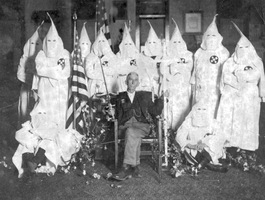 | Back to e-WV
| Back to e-WV
 The West Virginia Encyclopedia
The West Virginia Encyclopedia
 | Back to e-WV
| Back to e-WV
 The West Virginia Encyclopedia
The West Virginia Encyclopedia

The term Ku Klux Klan refers to a number of secret, racist societies that have existed at various times since 1865. The Klan originated in the South following the Civil War, seeking to reestablish and maintain White supremacy after the emancipation of the slaves. In West Virginia, Klan chapters organized in the late 1860s, after African-Americans acquired political rights and ex-Confederates were disenfranchised. Once voting privileges were restored to former Confederates in 1871, the KKK virtually disappeared in West Virginia for the next half-century.
The Klan reemerged nationally in the 20th century, with a significant revival in West Virginia in the late 1910s and early 1920s. National membership briefly totaled several million, and thousands of Klans men rallied in Washington and elsewhere. An out-of-state Klan publication carried reports from several West Virginia locations in 1924, including Clarksburg, Parkersburg, Williamson, and McDowell County. The Klan of the 1920s opposed Catholics, Jews, immigrants, and labor unions as well as Blacks. Several Catholic public school teachers in West Virginia were fired at the Klan’s insistence. The KKK also dabbled in politics and influenced the outcome of a number of local elections. Scandals weakened the organization, but several Klan chapters survived until 1944, when the secret order officially disbanded.
The years after World War II were bleak for Klan recruiters in West Virginia, and racial desegregation did not bring a large Klan revival in the 1950s and 1960s. The KKK experienced a brief resurgence during the Kanawha County Textbook Controversy in 1974-75, but leaders of the textbook protesters later denounced the Klan’s involvement as hurting their cause. There has been limited Klan activity in West Virginia since the mid-1970s, part of an attempted national resurgence. Many of the modern Klans are tied to neo-Nazi, Christian Identity, and other White supremacist groups. The contemporary Klans are not only xenophobic but also anti-government, and some of the groups advocate the overthrow of the federal government.
Written by Teresa Statler-Keener
Chalmers, David. Hooded Americanism: The History of the Ku Klux Klan. Durham: Duke University Press, 1987.
Newton, Michael & Judy Newton. The Ku Klux Klan: An Encyclopedia. New York: Garland, 1991.
Southern Poverty Law Center. Intelligence Report. Montgomery: Southern Poverty Law Center, 1999.